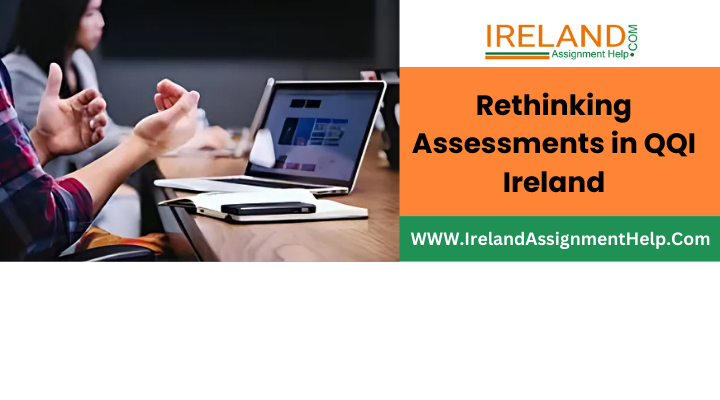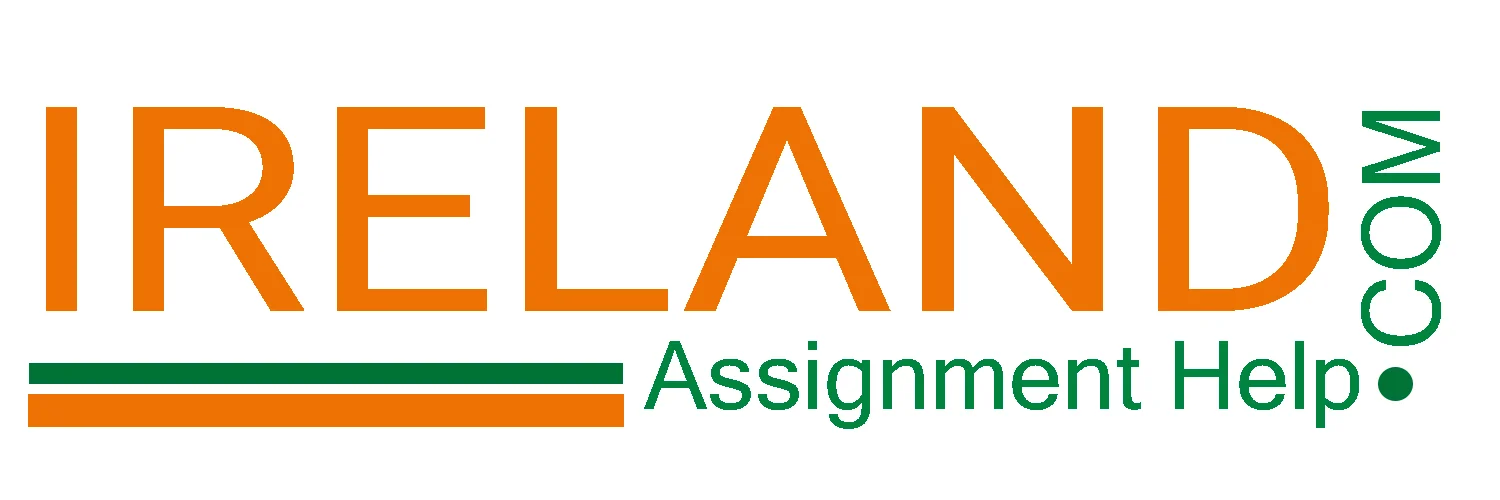Rethinking Assessments in QQI Ireland
In this fast-changing learning environment, the traditional assessment methods are not up to the diverse demands of the students and are slowly becoming inadequate for the changing needs.
QQI Ireland is overhauling the practice of rethinking assessment in QQI Ireland to make it modern, valid, and relevant in practice.
This blog delves into the worth of learning objectives, the reasons typical exams turn out to be largely inadequate, and innovative approaches to reframing assessments in Irish higher education.

Barriers Come Between Traditional Assessment in QQI Ireland
Exams and high-stakes assessments have long been a significant part of the performance evaluation system in education.
Though standardised, several might fall short of addressing the diverse spectrum of a learner’s capacities, insights, creativity, and understanding. Some of the major challenges confronting institutions and learners include:
- Anxiety and Stress: Students with other commitments, like a part-time job along with some family duties, normally have anxiety when they have to take high-stakes tests.
- Limited Inclusivity: Traditional tests do not account for different ways of learning like this, and other students will sometimes struggle to succeed.
- Real-world context application failure: Tests often focus too much on theoretical knowledge over practical skills, leaving the student unprepared for the reality of the workplace.
- Time constraints: In a scenario where online teaching is becoming more favoured and dominant, higher institutions need to make adjustments in their exams, in a way integrating modern demand while keeping professional integrity.
Hire an Irish Assignment Writer to Write your Essay, Thesis & Other Academic Papers
Rethinking Assessment via the Lens of Learning Outcomes
Most importantly, the discussion on rethinking assessments centres much on the quality of learning outcomes. Competent presentation of intended learning outcomes specifies what students are expected to know and be able to do by the conclusion of a module or by the end of a course.
QQI emphasizes that an effective and meaningful alignment of assessment with the learning outcomes is important. An assessment focused on a learning goal may:
- Acknowledge and accept different competencies, skills, and bodies of knowledge which learners need in practical situations.
- Provide a fair and transparent mechanism for measuring growth.
- Introduce a transition to more inclusive assessment methods and take into consideration the diverse requirements of learners.
Practical-skills-based assessment, such as that related to the development of child-centred care plans, would be beneficial for students who will be undertaking QQI child development and nursing and healthcare assignments.
Scared with Looming Deadline, Buy Plagiarism Free Paper Writing Services Now
Example of QQI Ireland’s current assessment methods
Innovative ways have been designed to make the assessment inclusive, relevant, and representative of real life. This, then, helps fulfil QQI Ireland’s objectives of rethinking assessment. Some examples that connect to QQI courses are given below:
Practical Demonstrations: In occupations like childcare and health care, a student demonstrates how they would practice in real situations. For instance, a student of childcare may create a fun learning game for young children, while a nursing student might carry out a clinical procedure.
Reflective Journal: One student’s experience can help other students develop an awareness of their learning. This method encourages reflexivity and idea exchange among peers that might not happen in a conventional classroom environment. Get your reflective journal assignment done from irelandassignmenthelp.com under the guidance of top experts.
E-Portfolio: This allows students to chart their growth over time. E-portfolios serve as electronic proof of learning and can include written assignments, videotaped hands-on projects, and other pieces that would show their growth as students.
Group Projects: In many professions, the capacity to work together is an indispensable competence. Group projects help the collaborative process of finding legitimate solutions, such as a marketing strategy or a client care plan for a case study.
Case Studies: The students demonstrate critical thinking and decision-making through real-world examples. A healthcare student would possibly devise a treatment plan for a particular case based on the case history of an individual patient, while a student of business might analyze a business admission’s strategy.
Modern assessment methods therefore provide means through which students demonstrate their application of knowledge in a manner likely to improve their education and professional development.
Academic Integrity’s Significance in Assessment
Academic integrity is still a very important part of the learning system, though QQI Ireland reevaluates its evaluation procedures. Considering that online learning is gaining popularity, concerns regarding plagiarism and academic misconduct have started coming up.
- Further ways to enhance academic integrity include the formulation of tests with lesser chances of cheating, such as open-book exams, demonstrations, or original projects.
- Academic misconduct Investigations into students involved in cheating, to discover and fairly penalize students involved.
- Enabling Irish students to use academic writing services to provide help in generating original and superior work.
Scared with Looming Deadline, Buy Plagiarism Free Paper Writing Services Now
How Rethinking of QQI Assessments Impact Irish Students
Students, especially those undertaking QQI qualifications in ‘hands-on’ subjects such as business, healthcare, and childcare, gain immensely from the rethinking assessment programme. These include:
- Better Learning Experience: Assessment variety enhances engagement among students and makes them better prepared for their careers.
- Fairer Assessment: Inclusive assessments ensure that every student has an equal and fair chance of achieving success, irrespective of their background or degree of skill.
- Real-World Applications: Competency and practical exams ready students to face the challenges they will meet in their professions.
These reforms, which emphasize practical skills and critical thinking, can do great service to students who require assistance with QQI child development assignments or assignments on nursing and healthcare.
Future of Assessments in Higher Education in Ireland
Much of the credit for advancing assessment scholarship in Ireland goes to the Rethinking Assessment Community Hub.
Indeed, the future of assessments in Irish higher education looks exceedingly promising with these research-driven initiatives and collaborations between institutions, educators, and politicians.
Research evidence would better enable institutions to develop assessments that align with the NFQ, solving contextually bound challenges faced by higher education institutions regarding how higher education institutions should accommodate contemporary needs of assessment.
Get 100% Unique Assignment Papers for Your College & Get Good Grades
Conclusion
This is not just a shift in assessment techniques in QQI Ireland but a radical movement towards holistic, fair, and experiential learning.
Ireland is forging a new path in higher education with its new student-centred approach through the prominence of learning outcomes, novel approaches, and ensuring integrity in academic methods.
Whether an Irish professional searching for academic writing help or a student seeking to have their QQI level 5 assignments assisted, these adjustments ensure that exams from now on will remain a real representation of one’s competencies and know-how as preparation for both academic and career success.
Frequently Asked Questions (FAQs)
1. Can someone help me do my QQI assignment on rethinking assessments?
Yeah, that’s grand — plenty of students look for help when QQI assignments get tricky. Getting expert guidance from Ireland Assignment Help means someone can outline ideas, structure the essay, and link it to QQI learning outcomes. It’s fully legal once you use it for reference and keep your own voice in the final draft.
2. Can someone write my reflective journal assignment for QQI Ireland?
3. How do I include real-world examples in my QQI childcare assignment?
Easy, just think about what you did on placement. For instance, if you ran a sensory activity in a Dublin crèche, describe it briefly—what worked, what didn’t, and how the kids responded. It makes your assignment feel lived-in rather than just copied from a guide.
4. What are QQI’s proposed assessment alternatives?
You know yourself, the usual long exams are starting to fade out. QQI’s bringing in more hands-on stuff — reflective journals, e-portfolios, case studies, even live skill demos. It’s not about memorising anymore; it’s more like showing you actually get it. The whole point is to keep things fair and closer to what happens out there in real jobs.
5. How should providers align learning outcomes and assessment?
To be honest, it’s about matching what’s taught with what’s being graded. If the module says “demonstrate teamwork”, then yeah, the assessment should probably involve working with others — not writing a five-page essay. Most centres in Ireland now keep a mapping chart so tutors can prove every task lines up with its learning outcome. Keeps QQI happy and students clear on what’s expected.
6. How is recognition of prior learning applied in QQI alternatives?
RPL’s getting more attention these days. Let’s say someone’s already worked five years in healthcare — they shouldn’t have to start from scratch. They can put together a small portfolio, supervisor note, maybe a skills log, and get credit for that. QQI’s trying to make the process smoother, especially for adult learners who are juggling work and family life.
7. What mapping template aligns LOs to alternative assessments?
There’s no magic one-size template, but most use a basic grid. One column for the learning outcomes, one for the activity, and one for how it’s checked. It looks simple but saves a lot of confusion later. Some tutors add a reflection box too — helps when verifying modules or chatting with the external examiner.
8. How should centres choose between alternative assessment types?
Depends on the subject really. Childcare might suit practical demos, business suits group projects, and healthcare often leans toward reflective journals. The rule of thumb’s “make it real”. If it feels like something that could actually happen in the workplace, you’re on the right track. A bit of variety keeps everyone engaged too.
9. How will the new QQI assessment methods reduce exam anxiety and stress for students with part-time jobs or family duties?
Oh, that’s a big one. Continuous assessment spreads the pressure out instead of piling it all on one day. Students working shifts or raising kids can hand in smaller pieces through the term — no sleepless nights over one test. It’s a gentler system, still serious, just not punishing.
10. What kinds of alternative assessments can I expect in practical subjects like childcare, healthcare, or business under the new QQI framework?
Mostly the kind that feel real. In childcare you might design a play plan; in healthcare maybe record a short reflective piece or a patient-care simulation. Business courses could use live cases or marketing projects. QQI’s big idea is to get students doing instead of just writing — more skills, less theory overload.
11. Are group projects mandatory now in QQI courses, and how are they assessed fairly?
Not all courses, no, but they’re popping up everywhere. Usually it’s half group mark, half individual reflection so no one hides in the background. Some tutors even let peers rate contribution — keeps it fair. Group work’s awkward at first but, to be fair, it teaches real collaboration better than any lecture ever could.
12. What are the deadlines and approval processes for changes to assessments in QQI courses?
Each centre handles it slightly differently, but big changes need early notice — usually a term ahead. The plan goes through internal verification first, then an external authenticator checks it against NFQ standards. Once signed off, it stays valid till the module review cycle rolls around again. Bit of paperwork, yeah, but it keeps the system clean.


